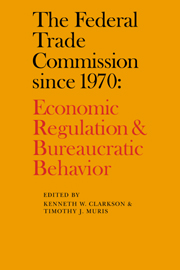Book contents
15 - Commission performance, incentives, and behavior
Published online by Cambridge University Press: 05 November 2011
Summary
This chapter discusses the common threads uniting Commission actions and begins to develop an explanation of how those threads relate to the agency's constraints and to the incentives of its employees. Relying extensively on Chapters 6 through 14, Section I summarizes the major characteristics of FTC activities. Section II briefly discusses the importance of the external constraints revealed in Part I of the book. Section III analyzes the FTC's internal organization and its relationship with the external constraints. Internally, the Commission is replete with important conflicts among its levels of authority, among its different types of professionals, and among its bureaus. Although the external constraints arising from Congress and other sources leave the Commission largely unconstrained, its internal organization creates constraints that guide much of the Commission's behavior. Section IV analyzes the incentives of FTC personnel, emphasizing the contribution of the lack of external constraints to the formation of human capital among FTC employees. Finally, Section V illustrates how the external constraints, the internal constraints, and the personnel incentives interact to produce FTC behavior.
Characteristics of FTC actions
Although Chapters 6 through 14 do not evaluate a completely random sample of the hundreds of Commission programs, they not only discuss programs representative of those undertaken since 1970, but also emphasize the cases with which the agency claims to have had its greatest impact. The following two sections examine these cases both to reveal that, despite its good intentions, the Commission's performance remains poor, and to show that FTC actions contain important, recurring themes.
- Type
- Chapter
- Information
- The Federal Trade Commission since 1970Economic Regulation and Bureaucratic Behavior, pp. 280 - 306Publisher: Cambridge University PressPrint publication year: 1981
- 2
- Cited by



